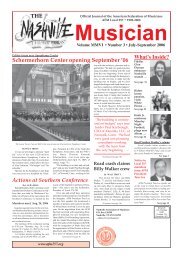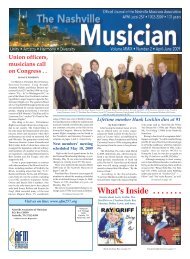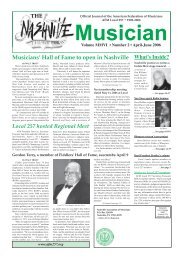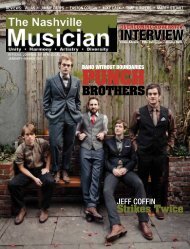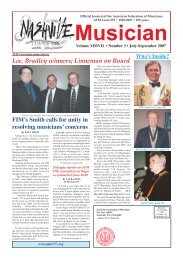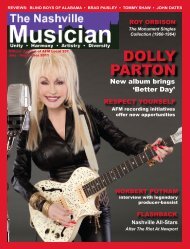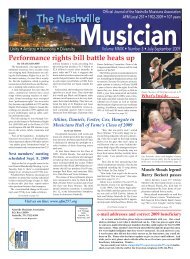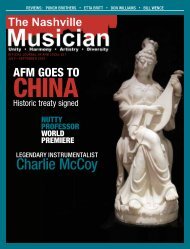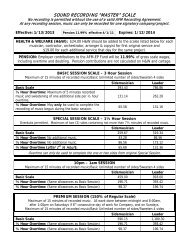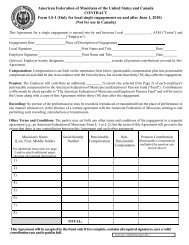Musicians Web pages - Nashville Musicians Association
Musicians Web pages - Nashville Musicians Association
Musicians Web pages - Nashville Musicians Association
- No tags were found...
You also want an ePaper? Increase the reach of your titles
YUMPU automatically turns print PDFs into web optimized ePapers that Google loves.
22 The <strong>Nashville</strong> Musician October-December 2006<br />
The three faces of Ferlin - a dynamic entertainer<br />
By WALT TROTT<br />
Ferlin Husky, who recorded a trio of million-selling<br />
country-crossover singles, is back<br />
after heart surgery with a brand new album<br />
“The Way It Is (Is the Way It Was).”<br />
A happier Husky, now in his 80th year,<br />
claims he’s feeling better and even boasts a<br />
new beauty on his arm, vivacious vocalist<br />
Leona Williams.<br />
Ferlin says the first time he had heart surgery<br />
was in Minnesota, “I had four bypasses.<br />
The next one was when they flew me in from<br />
Cody, Wyo., and it was at Baptist Hospital here<br />
in 1990. Then while working in Branson, I had<br />
another heart attack. I’ve had nine bypasses<br />
in all.”<br />
Perhaps best known by fans for his soaring<br />
rendition of the inspirational ballad “Wings<br />
Of a Dove,” Husky’s also celebrated for<br />
“Gone” one of the first signature songs marking<br />
the birth of the late 1950s’ revolutionary<br />
<strong>Nashville</strong> Sound. It was followed by Ferlin’s<br />
Top 10 cover version of Jimmy C. Newman’s<br />
1957 hit “A Fallen Star.”<br />
“It’s Leona’s idea really that I did the latest<br />
album . . . I didn’t really look forward all<br />
that much to going back into the studio. I just<br />
had eye surgery, wasn’t feeling all that well,<br />
and had given up on recording,” Husky muses.<br />
“For one thing, I had shortness of breath.<br />
Then while we were still in the midst of pulling<br />
it together, I had to go in for my heart again<br />
. . . and I got back in the studio about three or<br />
four weeks after that. But in the end, it came<br />
out pretty good.”<br />
In addition to the title tune written by<br />
Leona, Ferlin sang four of his own compositions:<br />
“We included some songs I’d done years<br />
ago. Leona sang on ‘A Dear John Letter’ and<br />
‘As Long As I Live,’ the old Kitty Wells-Red<br />
Foley duet, with me.”<br />
“A Dear John Letter” earned Ferlin his first<br />
Gold Record in 1953, featuring newcomer<br />
Jean Shepard singing, while Husky as a heartbroken<br />
Korean War GI read a tear-stained farewell<br />
letter from a former sweetheart. It stayed<br />
#1 six weeks on Billboard’s country charts (out<br />
of 23 weeks) and simultaneously scored Top<br />
Five on pop lists.<br />
Its success prompted Capitol Records to<br />
follow up within 90 days a popular answer tune<br />
“Forgive Me, John,” in which Jean Shepard<br />
renounced the brother she spurned him for. By<br />
its seventh week, it was a #4 country click -<br />
and also Top 20 pop. Briefly it appeared Husky<br />
was doomed to recitations, including “The<br />
Drunken Driver,” then cut songs that failed to<br />
chart, among them “Hank’s Song,” “Homesick”<br />
and “I Wouldn’t Treat a Dog Like You’re<br />
Treating Me.”<br />
It was 15 months after his second duet<br />
single that he again charted, this time with a<br />
solo two-sided hit, the upbeat “I Feel Better<br />
All Over, More Than Anywhere Else” (#6) and<br />
(about newsboy) “Little Tom” a tearjerker (#7,<br />
1955). That same year, Ferlin’s rube creation<br />
Simon Crum stormed the charts via the Top<br />
Five novelty number “Cuzz Yore So Sweet.”<br />
With his newly-formed Hush Puppies<br />
band, Husky charted - one week only - with<br />
“I’ll Baby-Sit With You” (#14, 1955). It was<br />
nearly two years before Ferlin returned to the<br />
Billboard charts, this time with a much bigger<br />
bang: “(Since You’ve) Gone,” #1 country 10<br />
weeks (out of 27 weeks’ charting), and yet<br />
another pop entry (#4, 1957). This time critics<br />
were in tune with the powerful baritone,<br />
which boasts a melodic but tearful vocal catch<br />
that captivates listeners.<br />
Ferlin in 1962 with then-wife Bettie, and their<br />
children: Dana, Denise, Danny and David.<br />
Husky: ‘When I seen anybody who had<br />
talent, I tried to help them . . .’<br />
The million-selling “Gone” was written by<br />
veteran entertainer Smokey Rogers, and first<br />
recorded by Husky (1952) when performing<br />
under the stage name Terry Preston. Rogers,<br />
who recorded a Capitol Top 10 himself in 1949<br />
“A Little Bird Told Me,” also wrote or cowrote<br />
the hits “Tho I Tried” for Wesley Tuttle<br />
(#4, 1946), “You Can’t Break My Heart” (#3,<br />
1946) with Spade Cooley, and “Spanish Fandango”<br />
with Bob Wills (flipside to Bob’s<br />
“Bubbles In My Beer,” #4, 1948).<br />
During a hit-and-miss 20+ years with the<br />
Capitol label, Husky charted 41 songs on Billboard:<br />
“I don’t know just how many years I<br />
was on there, but they did about 40 albums on<br />
me.”<br />
After his Capitol departure in 1972, he<br />
added another 10 singles for ABC; out of 51<br />
chartings, Ferlin totaled some 30 at or near<br />
Top 20. Although the trade weekly didn’t chart<br />
country albums until 1964 - thus ignoring<br />
Husky’s many earlier hit LP’s - he still managed<br />
to chart 14 Top 40 albums, notably “I<br />
Could Sing All Night,” “Just For You” and<br />
“Your Love Is Heavenly Sunshine.”<br />
Husky discussed these chartings and his<br />
60-year career, including successes, business<br />
associates, latest album and about being beset<br />
by health and personal problems in a twohours-plus<br />
interview at Shoney’s in suburban<br />
Hendersonville.<br />
“When troubles surround us, when evils<br />
come/The body grows weak, the spirit grows<br />
numb . . .” penned Bob Ferguson in his composition<br />
published by Husky Music in 1959.<br />
“When these things beset us/He doesn’t forget<br />
us/He sends down his love/On the wings<br />
of a dove . .”<br />
The lasting success of that song, and its<br />
eternal message, has sustained Ferlin Husky<br />
throughout a long and problem-prone life<br />
which included the loss of a son and multiple<br />
divorces. Fellow Missourian Ferguson, who<br />
10 years later wrote “The Carroll County Accident,”<br />
once explained “. . . Dove’s” inspiration:<br />
“This is a personal expression of faith<br />
and joy in achieving a goal. When I wrote it, I<br />
had just completed 13 films on wildlife (for<br />
the Tennessee Game & Fish Commission), and<br />
I was elated that the job was done.”<br />
Ferlin Husky was born Dec. 3, 1925 on a<br />
farm in Missouri, near the communities of Flat<br />
River, Hickory Grove and Cantrell, some 50<br />
miles south of St. Louis. (Various biographies<br />
have listed as his hometown one or the others,<br />
none of which are shown on our map.)<br />
The youngster received his musical inspiration<br />
from his mom, whose front parlor was<br />
a rehearsal hall for boys and girls with guitars.<br />
An uncle named Clyde Wilson taught<br />
Ferlin to play guitar, which he found under<br />
the Christmas tree shortly after his 9th birthday.<br />
In appreciation, he later gave Clyde a<br />
touch of celebrity by putting his name on songs<br />
that Ferlin wrote (notably the Top 10 “Little<br />
Tom”).<br />
“I loved Clyde. He passed away and was<br />
so proud that I put his name on them. He’d<br />
come to see me and I introduced him around.<br />
Another name I used on songs was Billy Cole.<br />
He was my cousin who died of cancer. I’ve<br />
used 17 different writer names.”<br />
Growing up in the Great Depression, and<br />
coming of age during World War II, helped to<br />
strengthen Husky’s character. He had a big<br />
heart and would help such struggling entertainers<br />
as Tommy Collins, Billy Mize, Dallas<br />
Frazier, Buck Owens and Roy Drusky.<br />
The latter’s son Roy Jr., nicknamed<br />
“Twig,” told us that shortly before dad’s death,<br />
Ferlin came up to the hospital to visit. Twig<br />
said he was unaware of Ferlin’s role in Roy’s<br />
early career: “After he left, my dad told me<br />
that Ferlin had helped him out back when he<br />
needed it, by letting him perform (and also recording<br />
Drusky’s ‘I Will’ in 1958). We were<br />
glad to see him.”<br />
“When I seen anybody who had talent, I<br />
tried to help them,” smiles Husky, recalling<br />
his early Bakersfield days. “Dallas Frazier was<br />
like my adopted son, just as Tommy was. They<br />
stayed at the house. When Tommy or Leonard<br />
Sipes (his real name) came out there to Bakersfield,<br />
I changed his name to Tommy Collins,<br />
taking it from a drink (Tom Collins). Buck<br />
Owens? I dressed him up, putting some decent<br />
clothes on him and got him with Capitol,<br />
and also Chester Smith, who wrote the hit<br />
‘Wait a Little Longer, Please Jesus.’ He had a<br />
great little run.”<br />
Husky himself would push the boundaries<br />
of country music, taking it in different directions<br />
simultaneously, stretching it by the<br />
sophisiticated balladry of “Gone,” then turn<br />
around and gently antagonize the era’s honky<br />
tonk stylists via his near-chart-topping parody<br />
“Country Music Is Here To Stay” as mimicked<br />
by alter ego Simon Crum.<br />
A versatile showman, Ferlin developed a<br />
unique ability to impersonate fellow entertainers,<br />
notably Roy Acuff, Jimmy Dickens, Eddy<br />
Arnold, Ernest Tubb, Hank Snow, Lefty<br />
Frizzell and even pop crooner Bing Crosby.<br />
Simon also managed the feat of singing a duet<br />
with himself, imitating Red Foley and Kitty<br />
Wells, then a popular recording duo. His was<br />
truly a one-man show.<br />
In fact, Ferlin/Simon’s sets were so dynamic,<br />
it got so other artists balked at following<br />
him in the spotlight, and bookers had to<br />
schedule Husky last, which didn’t phase him<br />
as that’s the traditional star spot. During<br />
Ferlin’s peak period, a beginner named Elvis<br />
Presley opened shows on tour with the headliner,<br />
from whom it’s said Elvis picked up<br />
pointers as an entertainer.<br />
With a 1957 summer replacement stint for<br />
CBS’ legendary Arthur Godfrey, Ferlin became<br />
one of the first country stars to host a<br />
network TV show. He also appeared in a 1957<br />
dramatic role on the Kraft Television Theater,<br />
and guested on numerous top-rated programs<br />
like Ed Sullivan’s Toast of the Town and Steve<br />
Allen’s Tonight Show.<br />
Ferlin appeared in Alan Freed’s 1957 romp<br />
“Mr. Rock & Roll,” then Capitol labelmate<br />
Faron Young and Ferlin co-starred in a 1958<br />
take-off threatening to set the movie business<br />
back on its ear, titled “Country Music Holiday,”<br />
featuring Zsa Zsa Gabor and June Carter.<br />
These achievements resulted in Husky being<br />
the first country artist having a star in his honor<br />
placed on the 1950s’ Hollywood Walk of<br />
Fame.<br />
Not bad for a kid who dropped out of<br />
The veteran star’s 2006 album.<br />
Ferlin in his hey-day.<br />
school after the eighth grade, and who later<br />
joined the Merchant Marine, shipping supplies<br />
and troops abroad.<br />
“I began entertaining on ship. We were<br />
transporting troops and to entertain them I had<br />
an old guitar I’d play on and sing songs. When<br />
we’d have a sub alert or an air raid, I’d tell<br />
stories, and all them boys would gather ’round<br />
me ’cause they were scared, ’n’ hell, truth is, I<br />
was scareder than they were. I’d make up the<br />
stories.”<br />
What sort of stories were they?<br />
“They were true stories to start with, but<br />
I’d tell ’em like I was somebody else and in<br />
this different voice,” explains Husky, adding,<br />
“You see, our neighbor across the creek back<br />
home in Missouri was named Simon Crump.<br />
I would tell stories about him out there in the<br />
country. Most of my shipmates were Yankee<br />
boys - oh, there were a few blacks who were<br />
my buddies, because like me they were from<br />
the South - and they all called me ‘Country.’<br />
“They would say, ‘C’mon Country, tell us<br />
some of those Simon stories.’ I told them Mr.<br />
Crump was a big tall guy, sort of like Gary<br />
Cooper when he played ‘Sergeant York’ and<br />
that was the type of man Simon was. Actually,<br />
he was like an uncle to me, and his daughter<br />
still writes to me. Anyway, they got to<br />
where they enjoyed hearing me tell stories.”<br />
With World War II concluded, Ferlin returned<br />
to the St. Louis area seeking an opportunity<br />
to put his talent to use: “Roy Queen was<br />
a gentleman who used to be on KMOX radio<br />
there, and had been like Happy Cheshire and<br />
Uncle Dick Slack, who were radio personalities<br />
when I was a kid working on the farm.<br />
Roy was a big DJ later for years and years. He<br />
passed away about three years ago . . . But<br />
Roy got me started . . . ”<br />
Ferlin took a stage name of Tex Terry and<br />
gained a radio slot on KXLW-St. Louis: “After<br />
I left home, the reason I never used my<br />
own name is because my parents never wanted<br />
me in the music business. So when I started<br />
working the honky tonks in St. Louis, I used<br />
Tex Terry as I didn’t want to disgrace them.<br />
After I became a success they were proud.”<br />
In 1947, Ferlin relocated to the West Coast<br />
where he worked in radio and met up with a<br />
name artist who himself had “graduated” from<br />
radio to movie stardom, playing sidekick to<br />
cowboy king Gene Autry.<br />
“Smiley Burnette helped a lot of people. I<br />
got a job working with Smiley at the Big Barn<br />
when he had a four or five-piece band workin’<br />
that place. He talked to me backstage and<br />
asked me to go on tour with him. Well, I went<br />
on the one tour and when we got back, he got<br />
rid of all them and just kept me. I worked with<br />
Smiley about two years.”



